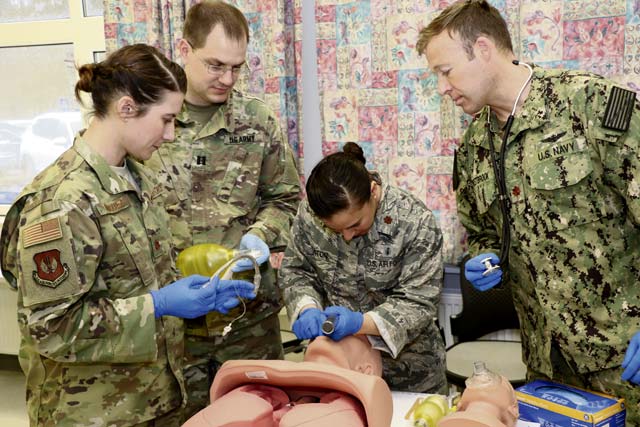
Medical providers from the Army, Air Force and Navy gathered at Landstuhl Regional Medical Center March 14 to 15 for certification in Advanced Trauma Life Support, a program designed by the American College of Surgeons to equip medical providers to identify, treat and manage life-threatening injuries in trauma patients.
LRMC is the only location within the U.S. European Command that offers ATLS training. Aside from the U.S. Army Medical Command, providers come from U.S. Forces Command, U.S. Africa Command as well as from the Air Force and Navy. In addition, the pass rate for the course at LRMC is nearly 100 percent.
As a surgeon in LRMC’s Ear, Nose and Throat Clinic who deals mainly with facial traumas, Air Force Maj. Brent Feldt also serves as the ATLS course director, a volunteer position he acquired due to his experience as an instructor following initial certification in the course.
“The goal of ATLS training is to standardize that initial trauma assessment and management,” said Feldt. “We put the students in the mindset that if they were the only provider in a rural setting and a trauma patient presented, these are the steps you would take to treat him or her.”
Additionally, Feldt emphasized that ATLS is also a way to teach both military and civilian providers from across the service branches to speak the same language in a trauma setting.
This most recent course consisted of 15 students — seven Army, five Air Force and three Navy, taught by seven instructors from the Air Force and Navy. Although there are Army providers certified to teach ATLS at LRMC, each instructor must volunteer his or her time depending on current mission and organizational needs.
“Trauma isn’t something reserved for an emergency room setting,” said Feldt. “We instruct everyone from Air Force flight medics to Navy family practice providers to even Army pediatricians. It’s important that we can all understand each other if a trauma situation arises.”
While all military providers who offer trauma care are required to have ATLS certification, Feldt indicated that the training is actually geared for those medical professionals who don’t have an immediate need for trauma training, like pediatricians.
“Readiness is our priority and a pediatrician or internal medicine doctor may find himself or herself deployed to a forward combat theater,” said Feldt. “They have to be ready to participate in critical care and ATLS equips them with those trauma skills.”
During the two-day training, students are challenged with both lecture-based information and hands-on simulation. Class sizes are kept small so the student to instructor ratio is low, allowing for more personal training. To wrap up the course, students must pass both a written exam and a capstone scenario where they are graded one-on-one by an instructor who provides a trauma scenario. The students must walk the instructor through the scenario, step-by-step, verbalizing each action and performing treatment on the simulation manikins.
“The ATLS training now is much more robust as far as opportunities to interject scenarios that we can see in a deployed location,” said Air Force Maj. Monica Sickler, a family physician and flight surgeon at Aviano Air Base, Italy, who last took the course in 2015. “I’ve been deployed twice since I last took ATLS and while the traumas I did encounter were not considered major, I did feel ready and confident because of what I learned from the course.”
While ATLS certification is only offered to credentialed providers like physicians, nurse practitioners and physician assistants, Army combat medics often find their way to the training for knowledge retention and skills maintenance.
Sgt. Fotty Manneh, the force health protection noncommissioned officer in charge at the U.S. Army Health Clinic Hohenfels, Germany, and a combat medic, was one such student. In preparation for his mission to Bulgaria later this spring, Manneh took the course to challenge himself to think beyond that first hour of care in a combat environment.
“I’m providing clinical support for the rotational units coming out,” said Manneh. “I’m a combat medic, not a doctor. ATLS gave me a firmer understanding of prolonged care. I’m trained in tourniquets and some of that baseline medic care, but ATLS helped me think beyond that. If I’m with an injured Soldier for more than an hour or two, now I know I can do more.”
Moving forward, Feldt hopes to take the course on a roadshow, offering it at more locations throughout the European theater and getting more providers trained in ATLS. He credits Regional Health Command Europe with providing the opportunities for non-Army providers to attend the course, and it means a lot to him that the Army is taking care of him as an Air Force program director.
“[The other services] have the same training requirements as we do and their instructors enable the course,” said Col. Edward Michaud, chief of clinical operations for Regional Health Command Europe and major proponent of the course. “It’s also important that LRMC, as a trauma center, maintains this training.”
ATLS is offered at LRMC four times a year. For more information, please contact the LRMC Education Division at DSN 314-590-7110 or +49 (0) 6371-9464-7110.


